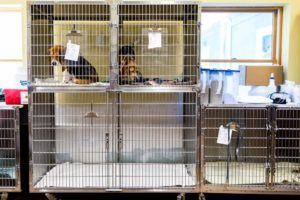It was a team effort between organizations that might not normally register as friends or colleagues. After months-long investigations, People for the Ethical Treatment of Animals (PETA) and the Humane Society of the US (HSUS) filed a sickening case of animal neglect and cruelty to the Department of Justice. Surprisingly, the DOJ put the punitive hammer down on Envigo, a medical research company that breeds animals to use in product testing. It was the largest animal welfare abuse case ever investigated, and some believe it was a long time coming. The feds let the Envigo dogs out, and now 4,000 beagles have a new lease on life.
 The department acted after the company violated – repeatedly – the most basic of requirements for breeding and keeping animals for research. They filed suit last May, claiming Envigo “was failing to provide humane care and treatment to the thousands of beagles.” Animals were deprived of water, clean cages, room to walk, food free from feces, and basic veterinary care.
The department acted after the company violated – repeatedly – the most basic of requirements for breeding and keeping animals for research. They filed suit last May, claiming Envigo “was failing to provide humane care and treatment to the thousands of beagles.” Animals were deprived of water, clean cages, room to walk, food free from feces, and basic veterinary care.
At the time, Senator Mark Warner (D-VA) said, “We’ve seen these horrific incidents … it needs to be shut down…Not only do we want the Cumberland facility to be closed on a temporary basis to make sure that we don’t see these violations, but we want to make sure there is a thorough review of Envigo’s facilities elsewhere around the country.”
Envigo did not hold up under pressure and intense scrutiny.
They All Get the Credit
PETA started an undercover investigation in 2021 after rumors leaked out of the Envigo facility in Cumberland, VA. After carefully detailing proof of inhumane conditions, the evidence against the facility was too overwhelming to ignore. The US Department of Agriculture (USDA) then cited Envigo for more than 70 violations of the federal Animal Welfare Act (AWA), corroborating PETA’s meticulous reporting.
“With our groundbreaking undercover investigation that blew the lid off neglect, intense confinement, suffering, and death at Envigo’s massive beagle-breeding facility in Cumberland, Virginia, PETA helped spark a historical domino effect that paved the way for the closure of the dog prison,” PETA boasted. The USDA then published more details after federal veterinarians demanded access. It’s the kind of information that people don’t talk about at dinner parties: “15 dogs denied treatment for severe dental disease, wounds, yellow discharge around the eyes, a puppy covered with feces in a waste pan; dogs denied food for days while nursing puppies and those pups were found damp, shivering, and cold.” Horrifically, the list only goes on, and the stories are not for the faint of heart.

(Photo by Anna Moneymaker/Getty Images)
It took months of site visits by the feds and multiple fines to the company for committing the same offenses over and over until the dam finally broke. It took pressure from PETA, DOJ, HSUS, and outrage across all media platforms before the company raised the white flag of surrender. All the Envigo dogs were released, and the company now finds its facility devoid of an Animal Welfare Act (AWA) license to breed. Envigo is permanently barred at the Cumberland facility from breeding and handling dogs for research purposes and is also required by a federal judge to pay for each of the 4,000 dogs taken in by rescue groups. It’s a measly $100 that wouldn’t cover gas to transport – but HSUS didn’t blink at the ridiculous amount, instead reaching out to animal rescue groups nationwide.
The ask was a big one: Can you commit to taking in dogs that had never been out of doors, on grass, or felt a loving touch? None of them had ever been given a name. It’s a long road for some to adapt. But the call was answered by 120 rescue groups, all willing to come up with another few hundred dollars to care for the beagles.
Envigo Dogs – A Hard Lesson in Life
Envigo, at first, did its level best to present a contentious front for what was being done behind closed doors. The company released a statement claiming the use of animals for research is “essential for developing lifesaving medicines, medical devices, and biologics, such as vaccines.” But unfortunately, any mention of the mistreatment and gruesome conditions was left out. Obviously, it only took a whiff of impropriety to have PETA hounding the company into a confession. And the next squeak out of Envigo came in the form of acquiescence:
“The required investments to improve the facility and the lead time to achieve these improvements have recently increased. As a result, we have decided we will not be investing further in this facility, and it will be closed. We will implement an orderly closure plan.”

(Photo by Anna Moneymaker/Getty Images)
The Envigo horror is certainly not the first high-profile and well-connected case of animal abuse for profit. It wasn’t that long ago that Dr. Anthony Fauci came under fire for cruel testing on beagle puppies in Tunisia. For animal rescues and watchers, Tunisia may have well been adjacent to the Swamp. The Beagle Freedom Project demanded that he stop funding and participating in the abuse, warning in a letter: “It is nothing short of criminal. It is time to end it, and now the world is watching.”
The public campaign is perhaps the most significant victory of late for humanity: Now everyone has been told across social media what has happened. There is no price too great for doing the right thing and being the voice of those who cannot speak. Since Envigo was exposed, beagle bills have popped up calling for more oversight and stiff penalties for animal welfare violations. Virginia Governor Glenn Youngkin has already signed five into law, and the interest seems to be spreading into other states where Envigo has facilities.

